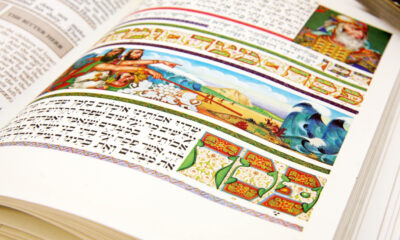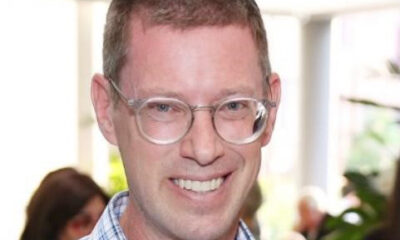
Religion

The antidote to antisemitism: loving the different
Dara Horn’s new graphic novel imagines the seder as a Harry Potter style portal which opens up centuries of Jewish history for us. It imagines seders taking place all the way back – from Sydney and Johannesburg to Riga and Warsaw and Beirut and Tehran and before that to seders in the Roman and Babylonian empires, all the way to the ancient land of Israel and beyond that, extending to the very first seder – when we killed a lamb, a god of the ancient Egyptians, roasted it whole, and ate it on the night of our freedom.
On that same night, we turned to our kids and began telling them a story, “We used to be slaves in Egypt but we’re being liberated tonight.” What does this freedom mean for us today, in 2025? These days, this thing called antisemitism has reared its head, online and in our world. As we sit for our seders this year and recall our ancient story of oppression, let us remind ourselves that the arc of history is long and it bends towards freedom.
In the opening lines of the book of Shemot, Pharaoh looks out at the Israelites who live in Egypt and notices our easy proliferation, the way in which we are reproducing. And Pharaoh utters a word which functions for him as both insult and justification. The Israelites, he says are “rav” and should therefore be oppressed and enslaved. “Rav” is described as “too much” or “in excess”. Quite literally, Pharaoh feels that our numbers might lead us to join with his enemies and defeat his army. But the word “rav” gives us a clue as to the deeper hatred Pharaoh harbours for the people of Israel. On a symbolic level, to be called “rav” (too much), is simply to be different! The common thread of all forms of antisemitism is simply that Jews aren’t the same as the dominant culture in which we find ourselves. Historically, some cultures sought to address our difference by making us the same as everyone – think conversion or assimilation. In other instances, tyrants sought to oppress us through slavery or eradicate our difference through genocide! “Rav” isn’t the purview of antisemitism alone. Being accused of “rav” or difference is at the root of many forms of prejudice: racism, homophobia, and misogyny. It rests on the assumption that all people should conform to a particular idea of sameness.
A few months ago, I had the privilege of taking a group of Grade 12 students to Poland. As we walked the paths of Auschwitz-Birkenau, the first thing I noticed was how the totalitarian Nazi regime despised difference. Jews, Roma-Sinti, homosexuals, Catholics, communists. Anyone who dared to think differently or who was deemed different was punished. The philosophy of Aryanism was a demagogy of sameness. As we walked, our educator asked us, “What is the opposite of Auschwitz?” At the end of the day, one of our teachers, Sidney Melamdowitz, said, “The opposite of Auschwitz is our students putting on their uniforms every morning, walking into the school gates, and showing up for a Jewish education.” In reflecting on her words which gave me goosebumps at the time, I feel that every time we assert our “ravness”, our difference as Jews, we respond to all forms of antisemitism and discrimination by saying, “Here we are … as we are!”
We asserted our difference on the first seder night ever by slaughtering a lamb as we left Egypt. We weren’t necessarily seeking to disrespect an Egyptian god. Rather, our first night of freedom was signalled by asserting our unique beliefs: “We are rav. We are different.” As we approach Pesach this year, I wish to add to my colleague’s words and say the opposite of Auschwitz is the leil seder in all its proliferations: with or without kitniyot, with or without gebrochts, longer seders and shorter seders, intellectual discussions or dramatic re-enactments, talking or singing. On seder night, let us remember that once upon a time, a Pharaoh sought to oppress us because he was threatened by our difference. With the help of G-d, we decided we would embrace our difference and offer the very concept of uniqueness as a gift to humankind.
The late Rabbi Lord Jonathan Sacks reminds us that being different is the Jewish people’s gift to humanity. No-one should be told that their feelings, politics, sexual orientation, progressive or conservative values are too much. We are all encouraged to embrace our uniqueness. Our difference needs to be a vehicle not for separation but for deep connection. If we try to connect with each other through simple commonalities and truisms such as, “We are all human and we all want the same thing”, we’re in danger of creating a shallow culture, relying on sentimental notions of, “We are all the same, man!” If we rely on sameness as a unifying force, we devolve to smallness. As Malvina Reynolds sang, “Little boxes on the hillside/little boxes made of ticky-tacky/Little boxes on the hillside/Little boxes all the same.” That we are all created in the image of G-d means we have a capacity of infinite otherness and largesse. We need to create community and a sense of humanity by playing large, not small!
We are reminded repeatedly in the Torah that “we should love the stranger for we were strangers in the land of Egypt”. If I may play Hassidic reader, I’m going to shift this to say that we should love and embrace strangeness for we were regarded as strange in the land of Egypt. This is the deep and true antidote to antisemitism. When we can love what is deemed strange in each other and ourselves, our cultural and individual idiosyncrasies, we have the opportunity to re-discover freedom. We are far from this ideal. But the Pesach seder reminds us that we haven’t finished seeking, finding, and celebrating our differences.
Chag Pesach kasher ve’sameach
- Adina Roth is a South African rabba and the director of Jewish Life at Emanuel School in Australia.










